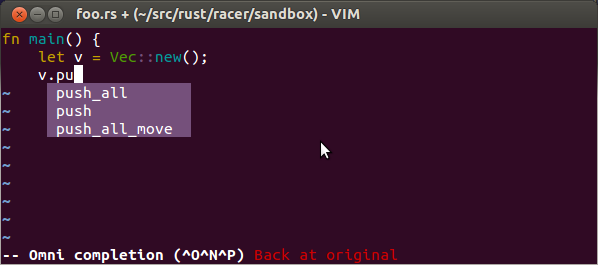Racer progress update (+ some vim support!)
It's been a few weeks since I posted about Racer, my rust code-autocompletion project, so here's another update.
First off, thanks to Michael Gehring who has been regularly submitting patches to bring Racer up to date with breaking Rust master changes. I have a very limited amount of time to work on Racer so I really appreciate this, thanks Michael.
The main news is that I've cobbled together a Racer vim plugin to go with the emacs one. I don't use vim much myself and I was kinda hoping somebody with expertise would show up and do this but I guess racer isn't sufficiently advanced for people to be interested yet. I'm a bit of a vim n00b so there's probably a much better way of structuring the plugin - any feedback or help would be gratefully received.

The other big improvement from last time is that racer can now perform some code completion of fields and methods (in addition to the static lookups I talked about last time). It turns out that type deduction is pretty involved. As an illustration here are the steps racer took in the screenshot above:
- In the screenshot the completion is being performed on fields of the 'v' variable. The plan is to find the type of 'v' and then locate all the fields and methods connected with that type beginning with 'pu'.
- Racer starts by searching backwards in the current scope, and parses the statement 'let v = Vec::new();'. It needs to evaluate the type of the right hand side of the expression so that it can know the type of 'v'. Vec::new() parses to a 'ExprCall' AST type with path: 'Vec::new'.
- Racer splits the path 'Vec::new' and starts searching for 'Vec'. 'Vec' is not defined in the screenshot and there are no 'use' or 'extern crate' statements in the file, so racer takes a look in libstd/prelude.rs. (The prelude module is implicitly included in all rust files).
- libstd/prelude.rs contains the line:
... #[doc(no_inline)] pub use vec::Vec; ... - 'vec' isn't defined anywhere in the prelude module. The next place to search is in the crate root, since paths in use statements are implicitly relative to the crate root. Racer hunts for the crate root using some heuristics and finds libstd/lib.rs.
- libstd/lib.rs (the std lib crate root) contains the line:
... pub use core_collections::vec; ... - The std lib crate root also contains the line:
... extern crate core_collections = "collections"; ... - The collections crate root contains:
... pub mod vec; ... - The vec module contains (amongst other things):
impl<T> Vec<T> { ... ... }#[inline] pub fn new() -> Vec<T> { Vec { len: 0, cap: 0, ptr: 0 as *mut T } } - Rather than parse the whole method Racer extracts the method type signature of new() and parses that. 'new()' returns a 'Vec<T>' type. Racer now has the type of the right hand side of the 'let v = Vec::new();' statement from step (2) and so knows that the type of the 'v' variable is 'Vec<T>'. All it needs to do now is look for fields and methods belonging to the Vec
type. It starts by looking for the definition of the Vec type. - Racer Locates the Vec struct in the the vec module
pub struct Vec<T> { len: uint, cap: uint, ptr: *mut T }- This is starting to get a bit boring so I'll cut the rest short: Racer looks for public fields in the struct (there are none), and then hunts for traits implemented for Vec and lists the methods (which it identifies as functions with 'self' as the first argument) starting with 'pu'. Phew!
Despite this elaborate field completing capability, Racer's type inference facilities are very far from er.. complete. At this point in time it is easy to confuse Racer with generic types, destructuring, lambdas and many other constructs that pop up all the time in rust code.
My plan now is to grind through each of these in some sort of order based on usage, probably starting with generics. My hope is that by incrementally adding smarts Racer will gradually become more and more useful and evolve into a fully fledged decent ide library by the time Rust hits 1.0.
Incidentally, this Thursday (26th June) is the first Rust London meetup, which looks like it is going to be awesome. (I'm not involved with organising it, just excited to be going!)
- Racer Locates the Vec struct in the the vec module